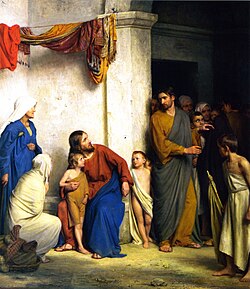| Matthew 18 | |
|---|---|
 Christ with children, by Carl Heinrich Bloch | |
| Book | Gospel of Matthew |
| Category | Gospel |
| Christian Bible part | New Testament |
| Order in the Christian part | 1 |
Chapter 18 of the Gospel of Matthew contains the fourth of the five Discourses of Matthew, also called the Discourse on the Church or the ecclesiastical discourse. [1] [2] It compares "the greatest in the Kingdom of Heaven" to a child, and also includes the parables of the lost sheep and the unforgiving servant, the second of which also refers to the Kingdom of Heaven. The general themes of the discourse are the anticipation of a future community of followers, and the role and "spiritual condition" [3] of his apostles in leading it. [4] [5]
Contents
- Structure
- Text
- Textual witnesses
- Receiving believers (18:1–11)
- Verse 1
- Verse 3
- Verse 6
- Verse 7
- Verse 11
- The local church (18:12–35)
- Restoring backsliders (18:12–14)
- Reconciling brethren (18:15–35)
- See also
- References
- Notes
- Citations
- Sources
- External links
Dale Allison states that this chapter offers "Instructions for the Church". [2] Addressing his apostles in Matthew 18:18, Jesus states: "what things soever ye shall bind on earth shall be bound in heaven; and what things soever ye shall loose on earth shall be loosed in heaven". [a] The discourse emphasizes the importance of humility and self-sacrifice as the high virtues within the anticipated community. It teaches that in the Kingdom of God, it is childlike humility that matters, not social prominence and clout. [4] [5]

